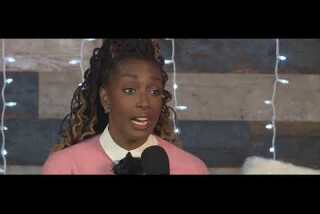Four female filmmakers lay out a road map for working toward gender equality in Hollywood
- Share via
Reporting from Park City, Utah — As the “Me Too” movement movement intensifies its look at the oftentimes abominable treatment of women in Hollywood, female filmmakers are devising ways to make changes.
Last month at Sundance, 37% of the festival’s 122 feature films were directed by women — a stat amplified by an abundance of panels focused on women in film. At the Women in Film panel “The Road to 50/50,” four female filmmakers discussed the disparity of representation in their industry, and in the process offered an unofficial road map for progress.
Hire women
It’s a simple concept — increase the number of women represented in film by hiring more women.
So what’s holding people back? One possibility is criteria, suggests Stephanie Allain, producer of “Leimert Park,” which premiered in Sundance’s new indie episodic section. A search for candidates with the most impressive backgrounds typically discounts those who haven’t yet been given a chance. Her solution? Alter the standard for employment.
“I used to say, ‘I want to hire the best people for the job,’” Allain said. “Then I realized by saying that, I was looking at metrics that were like, ‘Who has the best résumé? Who has the most awards? Who’s done the most work?’ And typically, those were all men — and most of them were white men. So I stopped saying that and started to say, ‘I want my sets to be diverse with all kinds of people, and I want to find the best of all kinds of people.”
It’s important that if you’re going to tell a story about a black woman, there better be a black woman somewhere in the room.
— Mel Jones
Diversity on sets can also be key in lending more authenticity to a film.
“It’s important that if you’re going to tell a story about a black woman, there better be a black woman somewhere in the room,” Mel Jones, director of “Leimert Park,” said.
That need for diversity exists at the decision-making table too, before and after a film has been given the greenlight.
Recalling an occasion just two years ago, Liz Destro — a producer of the dramatic competition selection “Lizzie” — was asked to fetch coffee during a buyer’s meeting. She happened to be the only woman in the room.
“Now when I go into the buyer’s meetings, there’s women there.”
Destro credits the existence of female financiers in those spaces with the possibility of making a female-driven movie like hers, which stars Chloë Sevigny and Kristen Stewart in a story about the infamous Lizzie Borden.
“All we can do is hire women and encourage others to hire women.”
Put your money where your mouth is
Talk is cheap, as the old adage goes. Conversation about the need for female representation in the film world continues to grow. But Amy Adrion — director of the documentary “Half the Picture,” which examines the struggles faced by female directors — argues that the stats still don’t accurately reflect the fact that women make up 50% of the population. Action is necessary.
“I think once you have more female agents and people of power, you’re going to have them fighting for women as much as men. It’s great that Mark Wahlberg donated his $1.5 million [from the “All the Money in the World” reshoots] to the Time’s Up campaign — as well he should — but I hope he told his agent, ‘Why don’t you fight for your female clients the way you fight for me?’ ”
Hollywood is a business, Adrion said. And like all businesses, it won’t invest in something that doesn’t return a profit.
“But these shows make money,” she said.
Jones believes that technology can help prove that point by looking at metrics and raw data to see what types of films connect with audiences.
“It empowers women to do a lot more without having to wait for permission.”
All we can do is hire women and encourage others to hire women.
— Liz Destro
Pay it forward
“The first movie I ever made was because of a mentorship,” Jones said. The film “Dear White People” was executive produced by Allain — the woman sitting next to her.
Allain argues that mentorship is important, but it’s not the end-all-be-all to the parity problem. That type of change, she said, comes once the culture as a whole has evolved. She highlights ReFrame, a program she founded to help create that type that of change.
Still, in the fight for equality, she believes diverse representation is a start.
“We know that when women are gatekeepers — whether they’re department heads or directors or producers — they’re keeping that door open for other women.”
2018 Sundance Film Festival


Video: Adapting 'Hamlet' for a woman's point of view in 'Ophelia'

Video: 2018 Sundance Film Festival Boomerangs

Video: A behind-the-scenes look at the 2018 Sundance L.A. Times photo/video studio

Video: The Kronos Quartet premieres its live documentary

"The Kindergarten Teacher" shows something many movies don't

Video: Filmmakers share thoughts on the future of women in film, the U.S. and storytelling
Twitter: @cshalby
ALSO:
Ruth Bader Ginsburg on her new Sundance documentary, her #MeToo revelation and ‘SNL’s’ ‘Gins-burn’
Riding with Jane Fonda to the Sundance Film Festival’s Respect Rally
Gloria Allred discusses shooting a film about herself and women gaining their voice
More to Read
Only good movies
Get the Indie Focus newsletter, Mark Olsen's weekly guide to the world of cinema.
You may occasionally receive promotional content from the Los Angeles Times.











